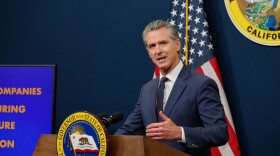RENEE MONTAGNE, host:
Boeing has formally protested the awarding of a lucrative contract awarded by the U.S. Air Force to a rival group that included a European jet manufacturer. Boeing claims the bidding and evaluation process was seriously flawed and unfair. Its workers and the company's supporters on Capitol Hill remain incensed that the Air Force chose what they call a French plane over an American one. But as NPR's Wendy Kaufman explains, today's large aircraft are global products and it would be hard to find one made in a single country.
WENDY KAUFMAN: When Boeing began making planes for the military 90 years ago, it was a quintessential American company. Today, it's a global one. Boeing boasts that its newest and most sophisticated jet, the 787, is being developed by an international team of aerospace companies. Most of the parts are being made abroad. Even the tanker that it proposed to build for the Air Force had about 15 percent foreign content, as industry analyst Scott Hamilton explains.
Mr. SCOTT HAMILTON (Analyst): The fuselage is built in Japan. The tail is built in Italy. And other components are built in the U.K.
KAUFMAN: The team that won the tanker project includes Northrop Grumman and E.A.D.S, the corporate parent of Airbus. Their plane will be built in France with major parts from Spain, Germany and Britain. It will be assembled in Alabama with General Electric engines made in Ohio.
Mr. LOREN THOMPSON (Analyst): Evendale, Ohio.
KAUFMAN: That's veteran defense industry analyst Loren Thompson.
Mr. THOMPSON: There's no such thing anymore as a complex product that is only built in one place. Almost invariably, whether it's an aircraft or it's an automobile or it's a piece of electronic equipment, the parts come from all over the world.
You know, the irony of living in a globalized economy is even when you think you're buying a domestic product, a lot of the time you're really not.
KAUFMAN: Globalization in Boeing's supply chain is driven by many factors - geopolitics, costs, expertise - and a desire to share the financial risk with outside partners. Back in the 1990s, for example, when China began buying lots of Boeing jets, the Chinese government wanted something in return. And they got deals to build Boeing planes.
Today, Boeing sells billions of dollars in aircraft overseas, and here's where free trade butts up against protectionism. Boeing workers and the company's allies on Capitol Hill are furious that Boeing didn't get the tanker deal. They know correctly that the Boeing plane would've resulted in substantially more American jobs. But these same individuals don't complain when Boeing wins huge contracts to sell planes abroad.
And, says Professor Stephen Kobrin of the Wharton School...
Professor STEPHEN KOBRIN (Wharton School): If we expect other countries' borders to be open to our products, then we have to open our borders to theirs. If we start to close our borders, then we have to expect they'll close theirs.
KAUFMAN: Boeing's protest of the tanker award is not based on the number of American jobs it would've created or an overall benefit for the U.S. economy, things the Air Force was not supposed to consider. Rather the appeal is based on what Boeing calls a seriously flawed process. But no matter what happens with the appeal, congressional sentiment to buy American, or at least buy the most American product available, runs deep, and the debate over the tanker project is far from over.
Wendy Kaufman, NPR News. Transcript provided by NPR, Copyright NPR.





